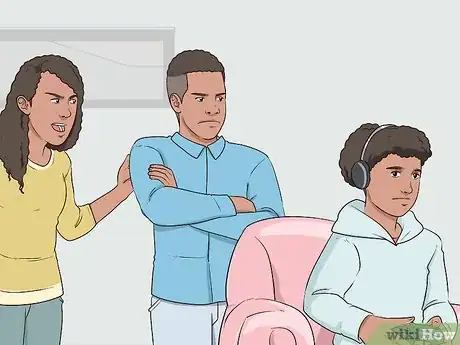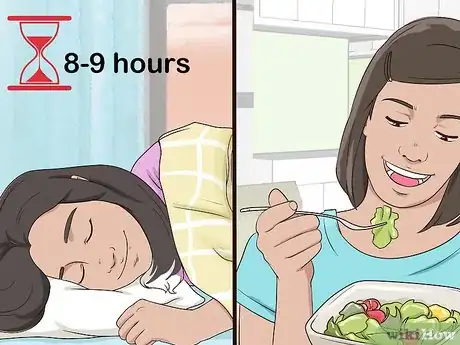This article was co-authored by Gera Anderson, PsyD. Dr. Gera Anderson is a Licensed Clinical Psychologist with more than five years of experience. She specializes in integrated behavioral health, neuropsychological assessment, and pain management, and has worked in community mental health settings, correctional facilities, psychiatric hospitals, and schools. Dr. Anderson received an MEd from The University of Minnesota, Twin Cities and a PsyD in Clinical Psychology from Pepperdine University.
There are 11 references cited in this article, which can be found at the bottom of the page.
wikiHow marks an article as reader-approved once it receives enough positive feedback. In this case, several readers have written to tell us that this article was helpful to them, earning it our reader-approved status.
This article has been viewed 180,415 times.
Adolescents look to their parents for safety and stability, so it can be really upsetting to hear parents fighting. Depending on how bad your parents' fights get, the issue may even affect your health and well-being. Learn to deal with your parents fighting by getting some distance when the fights are happening. Afterwards, try to talk to your parents about what you are feeling. It may also help to support your health and well-being by talking things out with a counselor and doing self-care.
Steps
Coping during Fights
-
1Stay out of the argument. First and foremost, you must not get in the middle of your parents' arguing. It’s understandable to want to stop it, but that’s not your job. They are both adults who will need to work out their issues between one another.[1]
- If you think one of your parents is in danger, call a relative, a neighbor, or dial 9-1-1 or the emergency services in your area.
-
2Get some distance. To limit your involvement in the argument, go outside or some other place in your home. Leave the environment where your parents are fighting until things calm down.[2]
- For instance, if a fight is brewing in the kitchen downstairs, go upstairs to your bedroom. If your parents start fighting during dinner, ask to be excused and go to another room.
Advertisement -
3Call a friend. It can be tough to hear your parents shouting at one another or calling one another nasty names. Take your mind off the fight by calling your best pal. You might even let them know what’s going on at home and warn them that you might call whenever things become tense.
- You might choose to talk about the fight or discuss something completely different, such as a TV show or a school event.
-
4Listen to music. If you have a stereo in your bedroom, bump up the volume to drown out your parents' fighting. Be sure not to exaggerate this—keep the volume within a moderate level. Or, you might grab a pair of headphones and listen to music from your phone or tablet.[3]
-
5Tell another trusted adult. If you have another adult family member, such as an aunt or uncle, you might call or text them to let them know about your parents fighting. Do this if you think the fighting is getting out of hand and are worried someone might get hurt.
- You might say something like, “Uncle Dan, it’s happening again and I don’t know what to do.”
Talking to Your Parents
-
1Wait until they are calm. Once the tension of the fight has faded, you might want to pull your parents aside to talk. You might do this the same day, or you might wait until the next day. Before talking to your parents, you might want to think about whether or not it's a topic you really want to talk to them about. Consider what the fight was about, and whether or not it's something your parents would normally talk about in front of you.
- You can talk to your parents about how you feel about them fighting in front of you without talking about the topic. Say, "How you and dad were talking earlier really upset me. It upsets me when you guys yell."
- Ask yourself, "What do I want to come from this discussion?" Let that be your guide.
- If you are afraid to talk to your parents or their fights are abusive, talk to another trusted adult, such as a relative, religious leader, mentor, teacher, coach, or counselor.
-
2Decide who to talk to. Choose whether you want to talk to one or both parents about how you’re feeling. It may help to discuss it with whomever you feel most comfortable talking to.
- For example, if, in the past, you have found that your dad was open to listening, you might try to talk to him first.
-
3Let them know how the fighting makes you feel. Be straightforward with your parents about how the fighting affects you. Describe everything, from what you are thinking to what happens in your body. Doing this will help your parents understand how worried you are and hopefully will motivate them to make some changes.[4]
- For instance, you might say, “Every time I hear you guys arguing, my stomach gets tied up in knots and my heart starts pounding. I’m worried you’re going to get a divorce."
-
4Recognize that some disagreement is normal in relationships. It may rattle you to hear your parents argue, but it’s perfectly normal for couples to disagree sometimes. If your parents' arguing is not an ongoing thing and there isn’t any hitting or pushing, you probably have nothing to worry about.[5]
- If you think your parents have a situation that is abnormal, look for signs that the fighting has become threatening, such as:[6]
- Destruction of property
- Talking about suicide or making threats
- Verbal threats
- Name calling and other verbal abuse
- Physical abuse, such as hitting or pushing
- If you think your parents have a situation that is abnormal, look for signs that the fighting has become threatening, such as:[6]
Dealing with the Stress of Parents Fighting
-
1Talk to your school counselor. You might choose to share your worries with a trusted adult at your school, especially if the fighting doesn’t stop after having a discussion. Your school counselor can help you work through what you’re feeling and help you come up distraction strategies to cope during the fights.[7]
- If your school has a social worker, you can also talk to them.
- The school counselor or social worker is also in a position to call a meeting with your parents to discuss how their fighting is impacting you.
-
2Ask for help, if your schoolwork starts to suffer. If the fighting continues, you might start to worry that your parents don’t love one another and that they may get a divorce. These worries may stress you out so much that you stop getting schoolwork done or have trouble concentrating. Let someone know if this is happening, so that they can intervene.[8]
- You can tell your school counselor if you’re having trouble completing schoolwork. They may connect you with a tutor or talk to your teachers so that you can make up any missed assignments.
-
3Support your physical and mental health. Counteract the stress of your parents fighting by taking measures to support your health. Be sure to get eight or nine hours of sleep each night to stay well-rested. Choose healthy, nutritious foods and get regular physical activity.[9]
-
4Create a self-care toolbox. Self-care is important when you’re feeling stressed. In addition to eating well, exercising, and sleeping well, you should also do things you enjoy. Make a list of fun or relaxing activities and place them in a box so that you can access them when stress occurs.[10]
- For instance, you might work on a puzzle, read a book, paint your nails, or draw to help relieve stress.
- You can also try deep breathing, meditation, and progressive muscle relaxation to keep stress at bay.
Dealing with Lasting Implications
-
1Work on your self-esteem. Many kids who grow up watching their parents fight in the household suffer from self-esteem issues. You might worry that you're the problem or think if you were a better kid, your parents wouldn't fight. First of all, you can't take responsibility for your parents' arguments, even if you are the subject of some of them. Take action to boost your self-esteem, so you don't have long-term problems in this area.[11]
- Help yourself feel more worthy by making a list of your positive traits. Hang the list up where you can see it often.
- Taking more risks can also boost your self-confidence. Put yourself out there to make new friends, pick up new hobbies, or work towards new goals.
-
2Learn to control your emotions. Being exposed to your parents' fights as a kid may also impact your ability to identify and control your emotions down the road. Mindfulness can help you combat this problem.[12]
- Spend some time each day sitting in silence. Do a body scan to notice how each part of your body is feeling. Is there tension? Is it relaxed?
- Notice what kinds of thoughts are going through your head. How would you label them (e.g. angry, peaceful, disappointed, etc.)?
- Doing this practice regularly can help you get in touch with your emotions. In addition, sitting mindfully while deep breathing can also be a great outlet for controlling/releasing emotions.
-
3Take baby steps with intimacy and vulnerability. Children who witness their parents fighting are more likely to have problems connecting in future relationships. This happens because you may have seen a lot of back and forth between your parents--one minute they're lovey-dovey, the next they're shouting--so you learn to distrust others. Get acclimated with showing vulnerability by taking small steps.
- First, establish a connection with someone. Then, make a minor disclosure, such as a favorite food or type of music. Determine how the person uses that information.
- If they react positively, share more. Maybe dig deeper by sharing a relatively innocent fear or worry you have. See if the person keeps the disclosure confidential. They should also be slowly making their own disclosures with you.
- If they do, you can slowly share more vulnerable details with them that let you build emotional, spiritual, and physical intimacy.[13]
Expert Q&A
-
QuestionHow do I make my parents love each other again?
 Gera Anderson, PsyDDr. Gera Anderson is a Licensed Clinical Psychologist with more than five years of experience. She specializes in integrated behavioral health, neuropsychological assessment, and pain management, and has worked in community mental health settings, correctional facilities, psychiatric hospitals, and schools. Dr. Anderson received an MEd from The University of Minnesota, Twin Cities and a PsyD in Clinical Psychology from Pepperdine University.
Gera Anderson, PsyDDr. Gera Anderson is a Licensed Clinical Psychologist with more than five years of experience. She specializes in integrated behavioral health, neuropsychological assessment, and pain management, and has worked in community mental health settings, correctional facilities, psychiatric hospitals, and schools. Dr. Anderson received an MEd from The University of Minnesota, Twin Cities and a PsyD in Clinical Psychology from Pepperdine University.
Licensed Clinical Psychologist That's not your responsibility, and you cannot control what other people do or feel. You can, however, try to bring more levity to the daily house interactions — this could be a joke, a compliment, a kiss, and so on. However, remember that, in the end, the only thing you will be able to control is how you act, feel, and think.
That's not your responsibility, and you cannot control what other people do or feel. You can, however, try to bring more levity to the daily house interactions — this could be a joke, a compliment, a kiss, and so on. However, remember that, in the end, the only thing you will be able to control is how you act, feel, and think. -
QuestionIs it normal for parents to constantly fight?
 Gera Anderson, PsyDDr. Gera Anderson is a Licensed Clinical Psychologist with more than five years of experience. She specializes in integrated behavioral health, neuropsychological assessment, and pain management, and has worked in community mental health settings, correctional facilities, psychiatric hospitals, and schools. Dr. Anderson received an MEd from The University of Minnesota, Twin Cities and a PsyD in Clinical Psychology from Pepperdine University.
Gera Anderson, PsyDDr. Gera Anderson is a Licensed Clinical Psychologist with more than five years of experience. She specializes in integrated behavioral health, neuropsychological assessment, and pain management, and has worked in community mental health settings, correctional facilities, psychiatric hospitals, and schools. Dr. Anderson received an MEd from The University of Minnesota, Twin Cities and a PsyD in Clinical Psychology from Pepperdine University.
Licensed Clinical Psychologist Fights and discussions are par for the course in every relationship. If by fighting you mean arguing in a manner that makes the environment feel unsafe, then it is not normal and you can try telling your parents how it makes you feel in a calm manner. If they continue with their unhealthy communication, you can ask them to limit your exposure to it by confining their behavior to a time or place when you are not around to witness it.
Fights and discussions are par for the course in every relationship. If by fighting you mean arguing in a manner that makes the environment feel unsafe, then it is not normal and you can try telling your parents how it makes you feel in a calm manner. If they continue with their unhealthy communication, you can ask them to limit your exposure to it by confining their behavior to a time or place when you are not around to witness it. -
QuestionI don't have anyone around me or anyone I can call. 2 days till school starts and I am alone with my parents and don't have anyone to call. What should I do?
 Tasha Rube, LMSWTasha Rube is a Licensed Social Worker based in Kansas City, Kansas. Tasha is affiliated with the Dwight D. Eisenhower VA Medical Center in Leavenworth, Kansas. She received her Masters of Social Work (MSW) from the University of Missouri in 2014.
Tasha Rube, LMSWTasha Rube is a Licensed Social Worker based in Kansas City, Kansas. Tasha is affiliated with the Dwight D. Eisenhower VA Medical Center in Leavenworth, Kansas. She received her Masters of Social Work (MSW) from the University of Missouri in 2014.
Licensed Master Social Worker There is always someone to call. In emergency situations, always call 911 or go to your nearest police station or hospital emergency department.
There is always someone to call. In emergency situations, always call 911 or go to your nearest police station or hospital emergency department.
References
- ↑ http://teens.webmd.com/when-parents-argue-constantly#1
- ↑ http://kidshealth.org/en/kids/parents-fight.html#
- ↑ http://www.mayoclinic.org/healthy-lifestyle/stress-management/in-depth/stress-relievers/art-20047257?pg=2
- ↑ http://steinhardt.nyu.edu/site/ataglance/2014/09/fighting-parents-hurt-childrens-ability-to-regulate-emotions-finds-study-by-psychologists-at-nyu-steinhardt.html
- ↑ http://kidshealth.org/en/teens/parents-fight.html
- ↑ http://www.teenhealthandwellness.com/static/hotlines
- ↑ http://teens.webmd.com/when-parents-argue-constantly#1
- ↑ https://www.livescience.com/28284-marital-conflict-child-development.html
- ↑ http://www.developmentalscience.com/blog/2014/04/30/what-happens-to-children-when-parents-fight
- ↑ https://www.psychologytoday.com/blog/dont-worry-mom/201302/12-tips-reduce-your-childs-stress-and-anxiety
- ↑ http://www.huffingtonpost.com/terry-gaspard-msw-licsw/the-way-parents-fight-aff_b_7176576.html
- ↑ http://steinhardt.nyu.edu/site/ataglance/2014/09/fighting-parents-hurt-childrens-ability-to-regulate-emotions-finds-study-by-psychologists-at-nyu-steinhardt.html
- ↑ http://spiritualityhealth.com/articles/bren%C3%A9-brown-how-vulnerability-holds-key-emotional-intimacy














































































